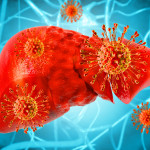Roughly 31 percent of people coinfected with both HIV and hepatitis C virus (HCV) can be successfully retreated for HCV after a first course of treatment has failed, according to a study published online January 23 in the Journal of Acquired Immune Deficiency Syndromes.
Success rates for standard HCV treatment, a combination of pegylated interferon and ribavirin, are not generally very high for people coinfected with both HIV and HCV. On average, rates of treatment success—achieving and maintaining undetectable HCV levels for six months after completing a one-year course of treatment, called a sustained virological response (SVR)—are less than 50 percent for people coinfected with both viruses. For coinfected people with strains of HCV called genotypes 1 or 4, the most common in the United States, fewer than 25 percent achieve an SVR.
To determine whether retreating people who had failed their first course of therapy might be successful, Pablo Labarga, MD, PhD, from the Hospital Carlos III, in Madrid and his colleagues conducted a study involving 52 coinfected individuals. Study participants received pegylated interferon combined with a dose of ribavirin that varied according to the participants’ weight.
In terms of previous treatment, 61 percent of the people had never achieved undetectable HCV levels while on therapy and 39 percent experienced an HCV viral load rebound after their treatment was discontinued. More than two thirds of the participants had genotypes 1 and 4, and 56 percent had advanced liver scarring, called fibrosis.
Labarga’s team found that retreatment could work in some people: Overall, 30.8 percent achieved an SVR after retreatment. As is true in general, people with genotypes 1 and 4 did less well. Success with retreatment was achieved in 19.5 percent of people with genotypes 1 or 4, compared with 72.7 percent of people with genotypes 2 or 3.
“In summary, retreatment of [HCV] in HIV-infected individuals…may be a reasonable option,” the authors conclude. “It may be the preferred alternative for the subset of patients with advanced liver fibrosis in whom the potential benefit derived from using new antivirals against HCV still has to be proven and which [may not be available for a] long time.”
Advertisement
Advertisement
Advertisement





Comments
Comments